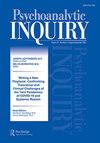The Development of an Analytic Mind, Analytic Identity, and Analytic Voice
IF 0.5
4区 心理学
Q3 PSYCHOLOGY, PSYCHOANALYSIS
引用次数: 0
Abstract
ABSTRACT This article describes the process of development and discovery of an analytic mind, identity, and voice. This is seen through the author’s personal journey during psychoanalytic training and practice. That journey, like that of many candidates, begins with a sense of curiosity and “not knowing enough” which then propels the candidate into a search for certainty. Central to this process is the interaction of one’s personal analysis, supervised clinical practice, and didactic seminars. These become a backdrop that works to free the analyst’s mind in the service of one’s analytic work. The author reflects on her nascent concept of analytic mind and describes it as the potential space in the mind which becomes recognized and developed through analysis and training, giving rise to a new way of thinking, experiencing, and understanding the underlying ambiguous forces that determine human adaptation and distress. The author’s evolving concept of analytic identity is described as an inner sense of one’s self as an analyst, now represented in relation to a shared sense of mind and being part of a theoretical community with a shared history and approach to patient’s struggles. The developing idea of analytic voice is that voice in which we convey our work and express it to ourselves, our peers, and our patients. A voice with a new language that evolved from the analytic mind and identity, and is manifested in a greater capacity to show and communicate with patients and others.分析性思维、分析性身份和分析性声音的发展
本文描述了发展和发现分析思维、身份和声音的过程。这是通过作者在精神分析训练和实践中的个人旅程看到的。这段旅程,就像许多候选人一样,始于一种好奇心和“不够了解”的感觉,然后推动候选人寻求确定性。这个过程的核心是一个人的个人分析,监督临床实践和教学研讨会的相互作用。这些都成为了一个背景,使分析者的思想在分析工作中得到解放。作者反思了她最初的分析思维概念,并将其描述为通过分析和训练而得到认可和发展的心灵中的潜在空间,从而产生一种新的思维方式,体验和理解决定人类适应和痛苦的潜在模糊力量。作者不断发展的分析身份概念被描述为一种作为分析师的自我内在意识,现在代表着一种共同的思想意识,并成为一个具有共同历史和方法的理论社区的一部分,以患者的斗争。分析声音的发展理念是我们向自己、同事和病人传达工作成果的声音。一种从分析思维和身份进化而来的新语言的声音,表现在与患者和其他人展示和交流的更大能力上。
本文章由计算机程序翻译,如有差异,请以英文原文为准。
求助全文
约1分钟内获得全文
求助全文
来源期刊

Psychoanalytic Inquiry
PSYCHOLOGY, PSYCHOANALYSIS-
CiteScore
1.00
自引率
33.30%
发文量
65
期刊介绍:
Now published five times a year, Psychoanalytic Inquiry (PI) retains distinction in the world of clinical publishing as a genuinely monographic journal. By dedicating each issue to a single topic, PI achieves a depth of coverage unique to the journal format; by virtue of the topical focus of each issue, it functions as a monograph series covering the most timely issues - theoretical, clinical, developmental , and institutional - before the field. Recent issues, focusing on Unconscious Communication, OCD, Movement and and Body Experience in Exploratory Therapy, Objct Relations, and Motivation, have found an appreciative readership among analysts, psychiatrists, clinical psychologists and a broad range of scholars in the humanities.
 求助内容:
求助内容: 应助结果提醒方式:
应助结果提醒方式:


